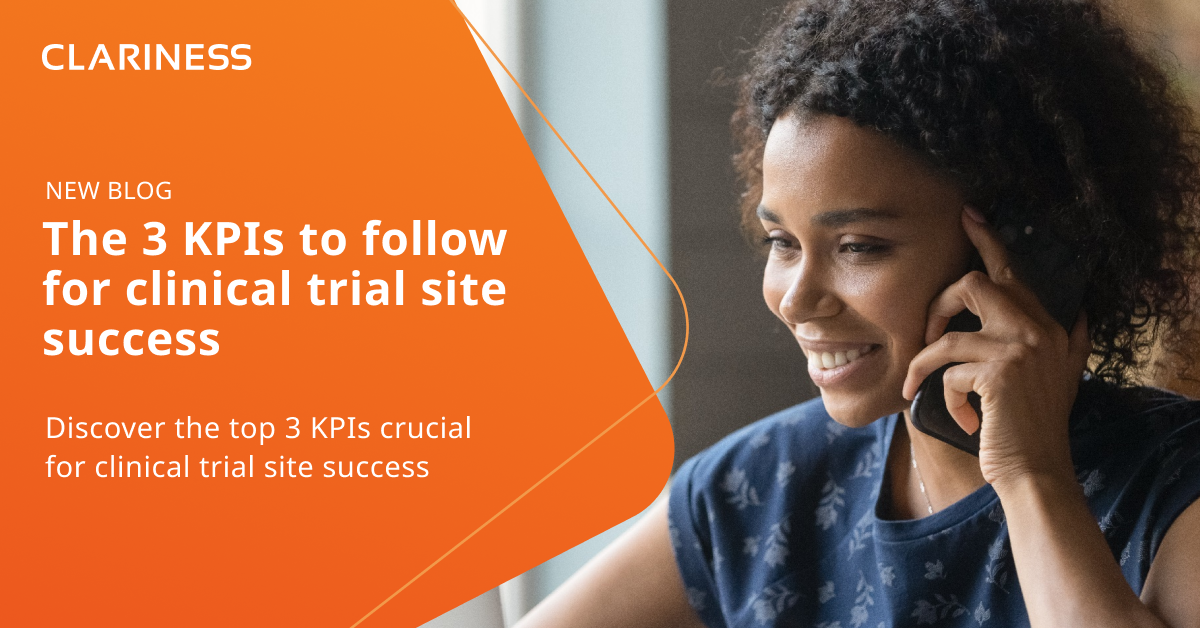How patient organization partnerships can tackle the most common patient recruitment barriers
Patients and the general public, have many misconceptions surrounding clinical trials. These constitute as one of the main reasons why people are unwilling to take part in them, and create a huge barrier for sites conducting clinical research.
Between 2016 and 2017, 30,000 people participated in clinical trials, by 2020 to 2021, this number, largely due to the increasing of COVID-19 vaccine trials, has grown to 300,000. While trial participation is dramatically rising, there is still much patient education required to tackle general misconceptions and further boost enrollment, especially of underrepresented groups.
Patient education can be a very slow process, so how can one shortcut the tackling of these misconceptions to accelerate recruitment?
Clariness has supported over 1,200 clinical trials, and with this, we have built an understanding of the common misconceptions that impact recruitment the most. Further, with 17+ years of quantitative recruitment data and qualitative understanding of patients’ needs through surveys and focus groups, we know the best ways to tackle these. We have found that by partnering with patient organizations, MedTech apps and research experts, we can more easily overcome these barriers.
In this blog, we discuss some of the most common misconceptions and how partnering with different organizations and institutions is key to changing individuals’ perceptions around this topic.
The most common barriers we tackle include:
- Lack of trust in pharmaceutical companies
- Lack of awareness and exposure of clinical trials
- Lack of patient education and information
1. Lack of trust in pharmaceutical companies
Surveys, studies and qualitative interviews show that pharmaceutical companies are often seen by patients as distrustful. In surveys this is called the fear of becoming a mere guinea pig. In addition, this lack of trust can exist because individuals may perceive clinical trials as high risk and have fears surrounding the unknown of possible side effects. Furthermore, this lack of trust may be driven by other factors such as lack of access to quality healthcare services or possible negative experiences with healthcare providers in the past.
Additionally, some people may fear that their data and personal information is exposed. This is why sponsors and investigators have to ensure that they are protecting and handling participant’s data in the best way and following strict protocols. This can be done by listing studies on a neutral platform that is confirmed to be fully GDPR compliant by independent security certificates and protocols.
2. Lack of awareness and exposure of clinical trials
Studies have actually shown that people have a lot of trust in their doctors and healthcare providers. However, in many instances these professionals don’t create awareness around the importance of clinical trials or medical research taking place. Therefore, this lack of awareness often leads to low engagement in clinical trials. It is important that doctors talk to their patients about ongoing clinical trials, as it can be beneficial not only to treat patients’ conditions but also to contribute to the advancement of science. Patients should be made aware of the advantages but also the risks behind clinical trials and the credibility of the people conducting them.
3. Lack of education and information
Patients, as well as people in general, may have negative perceptions about clinical trials (for example: that those who take part are not treated well or that it is not worth the effort). Therefore, its vital to share knowledge about clinical trials in advance so that potential participants will consider taking part. In many instances, patients will be unaware of the clinical research underway, which could help them and many others with their treatment. The way in which clinical trials are communicated is also important. By way of example, study materials written in patient friendly language by adapting the language of the targeted region is key to engaging the right patients. Also, listing all the important information and details beforehand, making clear if there is any sort of compensation for the studies, and explaining the inclusion and exclusion criteria.
How partnerships can tackle this barriers
By partnering with trusted, well-known corporations, Clariness has overcome these frequent misconceptions to boost patient enrollment and retention. We partner with three main types of organizations, these include:
- Patient organizations
- MedTech apps
- Research experts
1. Patient organizations
Leveraging existing trust
Patient organizations have built trust with patients and have developed more in the last 80 years. By working closely with a reliable source, patients are more likely to trust your organization, whether when recruiting for a trial or advertising one.
Clariness patient organization network/ partnerships includes: Bundesverband Neurodermitis e.V., LebensHeldin e.V., Bundesverband Selbsthilfe Lungenkrebs e.V., Deutsche Sauerstoff- und BeatmungsLiga LOT e.V., Progether, Blue Ribbon Deutschland and depressionsliga.de.
These organizations refer patients to us by promoting studies listed on our patient-centric clinical trial database, ClinLife®, in their medical content. These referrals often have a higher conversion rate because they have trust in the organizations.
We also help to support clinical research by partnering with medical magazines. Here is an example with the topic “Progress of Clinical Trials” conducted in Germany. From the patient’s perspective, our association with credible sources reinforces that we’re a trusted patient recruitment agency.
2. MedTech apps
Strengthening communication and patient education
MedTech apps are digital health tools that are focused towards doctors, pharmacists, among others and their goal is to help monitor health conditions, support with appointment scheduling and make useful recommendations for patients to maintain a healthy lifestyle.
MedTech is used by doctors with the purpose of improving treatments in the hospitals and also refers to new devices and different tools being developed.
We collaborate with some well-known MedTech apps such as: Mika, Nia and TOM. These apps can support patients, provide guidance throughout their treatment and can connect them with doctors and experts, making the process more personalized.
These apps are tailored to the patient’s interests, are reliable, efficient and provide access to all the relevant data available 24/7. Additionally, these kinds of tools, allow us to have direct access to large number of users and patients, bring patients in contact with our ClinLife® platform, create better engagement through these modern channels and therefore becomes an important touchpoint to connect with patients.
3. Research experts
Informing patients about the benefits of clinical trials
By partnering with research professionals, we ensure that patients have the best possible experience when undergoing a clinical trial, that the process is satisfactory, and the outcome is optimal. This type of collaboration contributes to the education and training of sites. Furthermore, they add decentralized patient data to the studies and improve communication between patients and treating physicians.
We partner with organizations such as Research Experts Alliance and Nextevidence. We create content and share our expertise with industry professionals and in return we get immediate credibility by being aligned to experts and organizations that are also data driven.
As a summary…
Clinical trials are not only important to develop new technologies and medicines worldwide, but also to ensure the best treatments and procedures for patients. This is why having top partners can help contributing with this mission. What is more, leveraging existing trust from patient organizations translate into saving a lot of time as you can skip the process of building it from scratch, shows that we are a well-establish player and a holistic player. When it comes to Medtech apps, they allow you to reach a wider number of patients and users that already have an interest in medical information and potential new treatments so they should be easier to enroll. Lastly, partnering with research experts provides immediate credibility not only for your trial but also to your brand.
To see the full list of our partners click here.
You can reach your desired target by teaming up with Clariness that helps you understand your patient population on an international level. Partners like Clariness with 17 years of experience and having successfully conducted more than 1,200 trials, which are available in 35 languages in 50 countries worldwide are key to make easier the task of recruiting.
Our registered users are more than 1.3 million, and the annual traffic to our website has reached 15 million visitors.
We have also developed ClinLife®, a patient friendly portal that brings patients and organizations together. By doing this, research sites and people seeking clinical research studies are connected. With this tool we tackle problems such as delays in clinical research, low awareness and low participation in clinical trials.
If you are interested in learning more about how we can improve your studies or becoming one of our partners, don’t hesitate to contact us here.
Are you a research expert do you work in a patient organization or in MedTech app and want to partner up with us? We would love to hear from you. To connect with us, please email us: [email protected]. There are many benefits on teaming up with us such as gaining instant credibility, access to an extensive database of patients that already trust us, years of expertise and most importantly, we help making patient’s lives better.
Want to know how we can support your patient recruitment?
Insights and recourses



